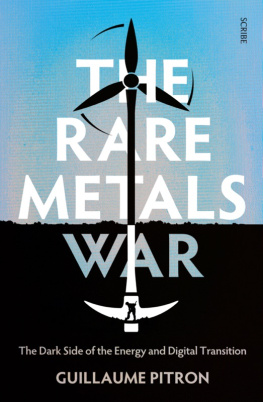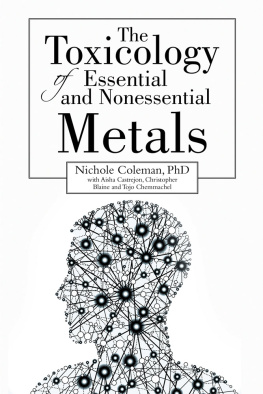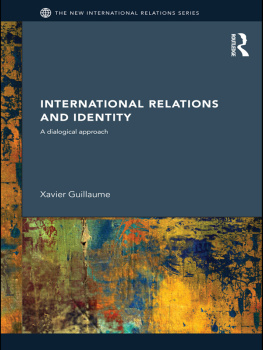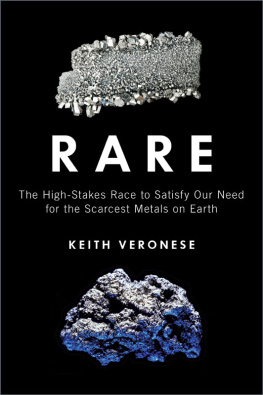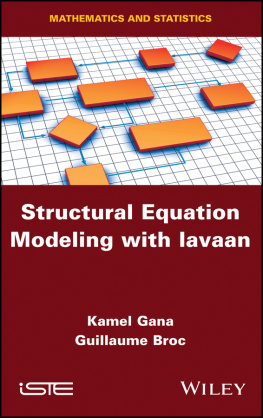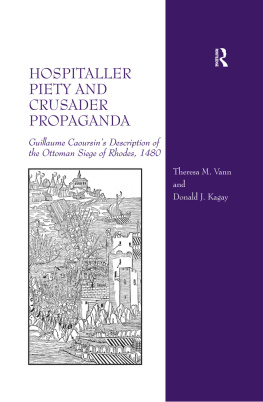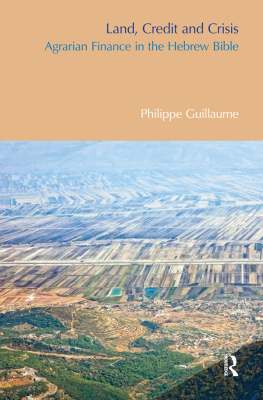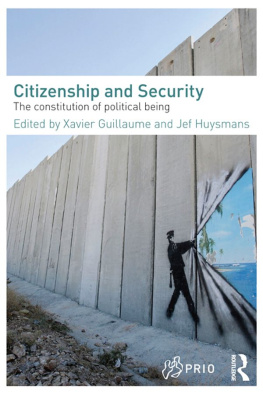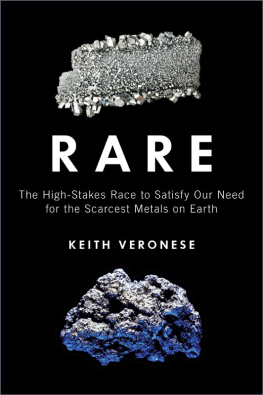Guillaume Pitron - The Rare Metals War
Here you can read online Guillaume Pitron - The Rare Metals War full text of the book (entire story) in english for free. Download pdf and epub, get meaning, cover and reviews about this ebook. year: 2020, publisher: Scribe Publications Pty Ltd, genre: Romance novel. Description of the work, (preface) as well as reviews are available. Best literature library LitArk.com created for fans of good reading and offers a wide selection of genres:
Romance novel
Science fiction
Adventure
Detective
Science
History
Home and family
Prose
Art
Politics
Computer
Non-fiction
Religion
Business
Children
Humor
Choose a favorite category and find really read worthwhile books. Enjoy immersion in the world of imagination, feel the emotions of the characters or learn something new for yourself, make an fascinating discovery.
- Book:The Rare Metals War
- Author:
- Publisher:Scribe Publications Pty Ltd
- Genre:
- Year:2020
- Rating:5 / 5
- Favourites:Add to favourites
- Your mark:
- 100
- 1
- 2
- 3
- 4
- 5
The Rare Metals War: summary, description and annotation
We offer to read an annotation, description, summary or preface (depends on what the author of the book "The Rare Metals War" wrote himself). If you haven't found the necessary information about the book — write in the comments, we will try to find it.
The Rare Metals War — read online for free the complete book (whole text) full work
Below is the text of the book, divided by pages. System saving the place of the last page read, allows you to conveniently read the book "The Rare Metals War" online for free, without having to search again every time where you left off. Put a bookmark, and you can go to the page where you finished reading at any time.
Font size:
Interval:
Bookmark:

THE RARE METALS WAR
Guillaume Pitron, who was born in 1980, is a French award-winning journalist and documentary-maker for Frances leading television channels. His work focuses on commodities and on the economic, political, and environmental issues associated with their use. The Rare Metals War is his first book, and has been translated into eight languages. Guillaume Pitron holds a masters degree in international law from the University of Georgetown (Washington, DC), and is a TEDx speaker. More information at www.guillaumepitron.com.
Bianca Jacobsohn is a South African/French translator and conference interpreter who specialises in energy, finance, strategic metals, and diplomacy. More information at www.biancajacobsohn.com.
Scribe Publications
1820 Edward St, Brunswick, Victoria 3056, Australia
2 John St, Clerkenwell, London, WC1N 2ES, United Kingdom
3754 Pleasant Ave, Suite 100, Minneapolis, Minnesota 55409, USA
First published in French in 2018 by Les liens qui Librent as La guerre des mtaux rares
First published by Scribe 2020
Text copyright Guillaume Pitron 2020
Translation copyright Bianca Jacobsohn 2020
All rights reserved. Without limiting the rights under copyright reserved above, no part of this publication may be reproduced, stored in or introduced into a retrieval system, or transmitted, in any form or by any means (electronic, mechanical, photocopying, recording or otherwise) without the prior written permission of the publishers of this book.
9781925849325 (Australian edition)
9781912854264 (UK edition)
9781950354313 (US edition)
9781925938609 (ebook)
Catalogue records for this book are available from the National Library of Australia and the British Library.
scribepublications.com.au
scribepublications.co.uk
scribepublications.com
To my father,
to my mother
CONTENTS
Chapter One
Chapter Two
Chapter Three
Chapter Four
Chapter Five
Chapter Six
Chapter Seven
Chapter Eight
Chapter Nine
Foreword
by Hubert Vdrine
French minister of foreign affairs under President Jacques Chirac, and secretary general and diplomatic adviser to French president Franois Mitterand
IN AN INCISIVE AND TROUBLING ACCOUNT, GUILLAUME PITRON SOUNDS THE alarm on a serious geopolitical problem: the worlds growing reliance on rare metals for its digital development in information and communication technologies. This includes the manufacture of devices such as mobile telephones, not to mention the much-lauded electric and/or hybrid car, which requires twice as many rare metals as the humble internal-combustion engine vehicle.
There is nothing untoward about these thirty or so rare metals bearing perfectly civilised Latin names like promethium. They are found in minute proportions in more abundant metals, making their extraction and refinement expensive and difficult. The first problem is that most of these resources are in the hands of China an advantage it is naturally tempted to exploit. Other countries with such underground resources have for various reasons abandoned their mining operations, which largely gives China a global monopoly and Beijing the title of the New Rare Metals Master.
Pitron illustrates the perils of this dependence with numerous case studies ranging from super magnets to long-range missiles where the West has acted inconsistently or entirely without foresight. The solution seems obvious: reopen rare metal production in the United States, Brazil, Russia, South Africa, Thailand, Turkey, and even in the dormant mining giant of France.
Enter the next predicament: mining these rare minerals is anything but clean! Says Pitron, Green energies and resources harbour a dark secret. And hes quite right: extracting and refining rare metals is highly polluting, and recycling them has proved a disappointment. We are therefore faced with the paradox that the latest and greatest technology (and supposedly the greenest to halt the ecological countdown) relies mostly on dirty metals. Thus, information and communication technologies actually produce 50 per cent more greenhouse gases than air transport! Its an especially vicious circle.
How do we overcome the contradiction?
We need to revive the mining of rare earths and of mineral resources internationally (potentially reviving tensions between governments and mining companies), but in an environmentally sound way, using the latest financing, innovation, and other economic and technological means. According to Pitron, more and more consumers around the world would be willing to foot the bill.
The author ends his thesis on a positive note by giving examples of the sudden wake-up call taking place in the rare metals industry.
The ecological transition of our economic activities is critical, not just for saving the planet, but for preserving life on the planet including human life. We can expect hundreds more such challenges to overcome, difficult decisions to be made, scientific breakthroughs to reach, and opinions to support or enlist if we are to accelerate this transition. Meanwhile, the clock is ticking.
Through the focus of his investigation, Guillaume Pitron alerts us to an issue that is vital yet inadequately considered.
Introduction
FOR FOUR THOUSAND YEARS, HUMANS DEPENDED ON FIRE, CAPRICIOUS winds and currents, and manpower and horsepower to roam, build fortresses, and work the land. Energy was a rare and precious resource, movement was slow, economic growth sluggish. Progress came in fits and starts, and history tended to be made one slow step at a time.
Then, from the eighteenth century, humans used the steam engine to power their looms, propel locomotives, and float battleships to reign over the seas. Steam powered the first industrial revolution. This was the worlds first energy transition, and one underpinned by the use of an indispensable fuel: a black stone called coal.
In the twentieth century, humans cast aside steam for another innovation: the petrol engine. This technology made vehicles, boats, and tanks more powerful, and paved the way for a new machine the aeroplane to conquer the skies. This second industrial revolution was also an energy transition, this time relying on the extraction of another resource: a rock oil called petroleum.
The disruptive effects of fossil fuels on the climate since the turn of the current century have driven humanity to develop new and supposedly cleaner and more efficient inventions wind turbines, solar panels, electric batteries that can connect to high-voltage ultra-performance grids. After the steam engine and the internal-combustion engine, these green technologies have shifted us into a third energy and industrial revolution that is changing the world as we know it. Like its two predecessors, this revolution draws on a resource so vital that energy experts, techno-prophets, heads of state, and military strategists already refer to it as The Next Oil of the twenty-first century.
What resource are we talking about?
Most people dont have the slightest idea.
Changing the way we produce and therefore consume energy is humanitys next great adventure. Political leaders, Silicon Valley entrepreneurs, proponents of more moderate consumption, Pope Francis, and environmental groups have urged us to make this change, curbing global warming and saving ourselves from a second flood. Never have empires, religions, and money been so aligned behind a single undertaking. The proof of this described by former French president Franois Hollande as the first universal agreement in our history is neither peace treaty, nor trade deal, nor financial regulation. The Paris agreement that was signed in 2015 following the twenty-first conference of parties to the United Nations Framework Convention on Climate Change (COP 21) is, in fact, an energy treaty.
Next pageFont size:
Interval:
Bookmark:
Similar books «The Rare Metals War»
Look at similar books to The Rare Metals War. We have selected literature similar in name and meaning in the hope of providing readers with more options to find new, interesting, not yet read works.
Discussion, reviews of the book The Rare Metals War and just readers' own opinions. Leave your comments, write what you think about the work, its meaning or the main characters. Specify what exactly you liked and what you didn't like, and why you think so.

